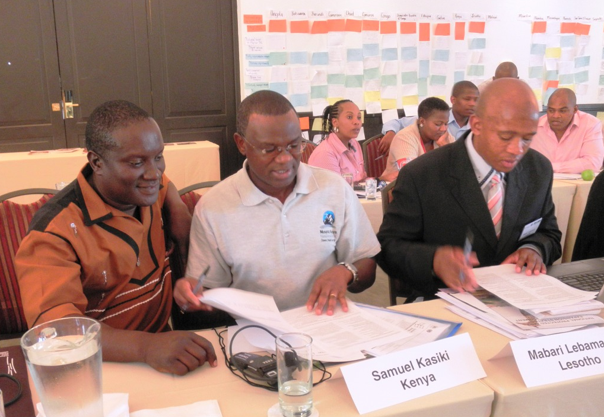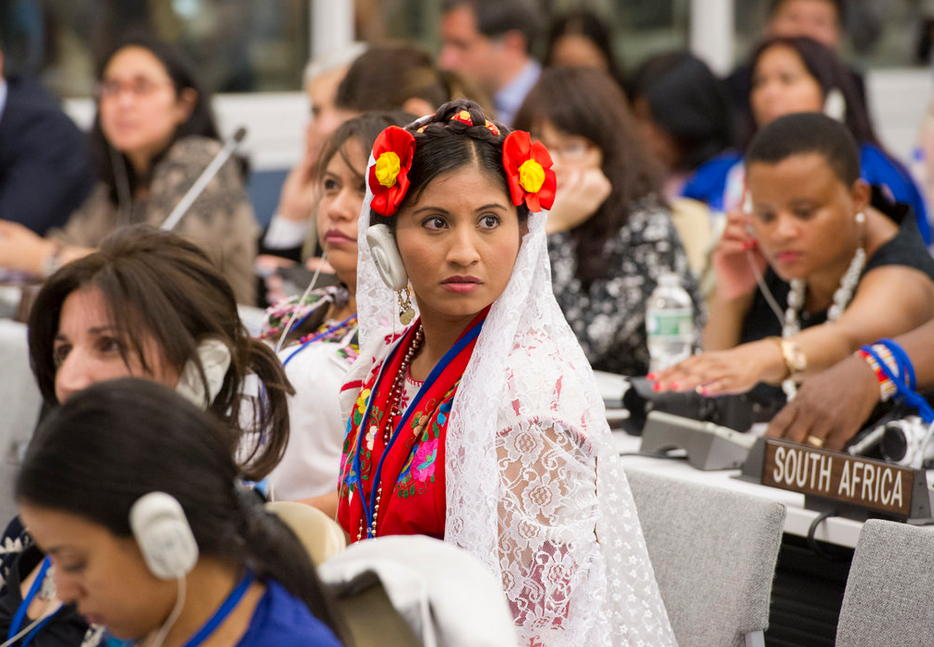Indigenous issues the talk of New York
The fourteenth session of the United Nations Permanent Forum on Indigenous Issues (UNPFII) began in earnest at the UN Headquarters in New York on Monday, 20 April and will focus on key indigenous issues related to economic and social development, culture, environment, education, health and human rights until its conclusion on 1 May 2015.
The current session, which is reviewing the implementations proposed following last year’s Forum, will focus on the ‘Principles of good governance consistent with the United Nations Declaration on the Rights of Indigenous Peoples’.
"Environment is a major issue in the UNPFII regular agenda, as it crosses many other topics related to Indigenous Peoples' societies, cultures and development," said Gonzalo Oviedo, IUCN's Senior Advisor for Social Policy, who is attending the forum on behalf of IUCN. "This year an important focus of the agenda is the link between indigenous issues and the Sustainable Development Goals (SDG).
"The general tone of the discussion was that more attention to indigenous issues was needed in the SDG process. IUCN has repeatedly highlighted that the current version of the SDGs goals, targets and indicators is insufficient to address Indigenous Peoples’ concerns, in particular on land and resource rights, as well as on the need to strengthen Indigenous Peoples’ contributions to the achievement of environmental goals 13 to 15. IUCN is working with other organizations to support integration of clearer indicators and targets on land tenure security of Indigenous Peoples especially as it relates to the conservation of their lands, territories and resources."
The proposed agenda for this forum corresponds thematically to Stream 7 of the IUCN World Parks Congress 2014 (IUCN WPC) - 'Respecting Indigenous and Traditional Knowledge and Culture' - and will review the ‘Principles of good governance consistent with the United Nations Declaration on the Rights of Indigenous Peoples’.
This meeting will include a discussion on the post-2015 development agenda, youth, self-harm and suicide, the Pacific region, and the human rights of Indigenous Peoples. An examination of the recommendations proposed from the high-level plenary meeting of the general assembly will precede a discussion of the post-2015 development agenda, which focused on 6 main areas.
These include the need for disaggregation of data, rights to territories and resources, free prior and informed consent; special measures that include health and education, access to justice and redress mechanisms, as well as participation and representation in decision-making in relevant bodies. During the UN Summit on Millennium Development Goals, member states specifically recommended that the negotiations and related processes of post-2015 development agenda ensure Indigenous Peoples had meaningful participation.
The principal issue of the agenda is ‘hunger and disease’, given that Indigenous Peoples constitute approximately 300 million of the world’s extremely poor rural people.
During the IUCN World Park Congress, which met in Sydney in 2014, a specific stream was included entitled ‘Respecting Indigenous and Traditional Knowledge and Culture’, which placed the spotlight on the need to recognise the rights of Indigenous People’s territories, lands, and cultural resources, whilst also protecting endangered areas.
This stream focused on engaging members of indigenous populations, local communities, authorities and organisations to recognise the role of indigenous and local communities in protected area management. The stream aimed to identify and deliver innovative approaches which will ensure the protection of endangered areas, whilst acknowledging the cultural and spiritual values of the people who live there.
From this stream, which notes that many protected areas - which form 14.6% of the world’s land and around 2.8% of the oceans - overlap completely or in part with traditional lands of Indigenous Peoples and rural communities, some of the legacies for ‘The Promise of Sydney’ were born.
This document proposed a set of bold yet promising approaches based on real, innovative solutions and included a vision for the future, an analysis of the current situation and recommendations and targets which reflect the proposed pathway towards this transformation. ‘The Promise of Sydney’ has highlighted key areas for development and outlined strategies for successfully managing protected lands to ensure their future, and the future of the millions of indigenous people who depend on them.





